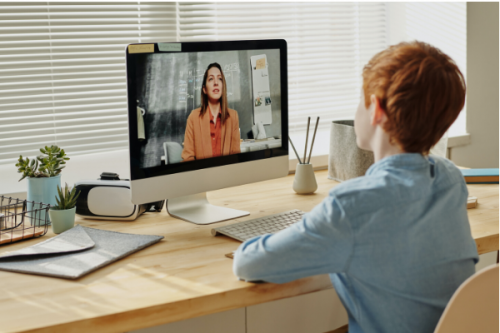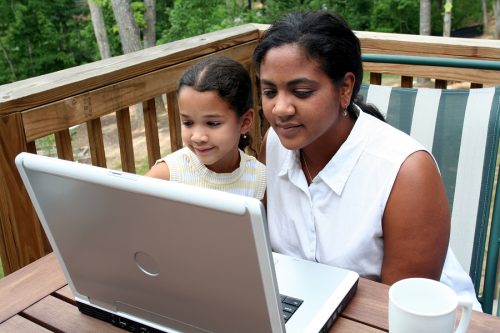With many of us working from home our kids are likely getting a unique look into our daily work lives as professionals. Some of us have had our kids drop in on a meeting (by accident or on purpose) or have had their own schedules for online learning impacted by shared space and technology. They may have even seen us lead a zoom brainstorm, a team meeting or watch as we navigate the new norm with new technology under time constraints.
But can watching parents juggle and fumble at home have a positive impact on these young minds?


For one university professor, the experience has given her two school-aged girls a rare glimpse of the education profession.
“They have seen me sending emails or on calls previously but conducting a class or meeting over zoom is something they haven’t seen me do before,” says Anchal Malik, an Assistant Professor at the University of Pittsburgh School of Dental Medicine. “I think more than what we do, the whole platform of our work being done virtually while they are around is something new for them. My eldest has developed an appreciation for the hard work her teachers have to put in to create an online learning session or assignment because she is seeing me doing similar work although at a university level.”
For some on the front lines of healthcare during this pandemic, seeing parents do their jobs at a different level has offered insight into what it takes to do more with competing priorities.

“They have a deep respect for the fact that practicing medicine is not a 9 to 5 job,” says Dr. Paramjeet Singh, a family physician in Ontario, Canada. She says her teenage son and daughter have seen her adapt to virtual care during the pandemic with fascination.
They are amazed at how my office has adapted to virtual care while still seeing those patients that need in-office visits. They also acknowledge the background work and endless hours of meetings and organization that go into implementing these changes, says Dr. Singh.
While the goal of juggling successfully is helpful, it’s equally impactful to watch parents struggle or adapt to new rules and ways of doing their work, says psychiatrist Dr. Shimi Kang, and author of The Dolphin Parent: A Guide to Raising Healthy, Happy, and the upcoming book Tech Solution: Creating Healthy Habits for Kids Growing up in Digital World.
Before the pandemic we were seeing a rise of perfectionism in kids. The school system had evolved into a very evaluative system. During this whole moment we have had to adapt, and we are learning from mistakes, says Dr. Kang.
She adds the ability to be comfortable with uncertainty is also a teachable moment.

Dr. Shimi Kang, author, psychiatrist
Kang, whose expertise lies in the neuroscience of mental health, addiction, motivation, relationships, and optimal performance, has spent over 20 years researching, treating, and working with people from all walks of life says this pandemic provides an opportunity to help kids understand uncertainty and is helpful for a growth or play mindset.
“It’s an open-ended approach to the uncertainty of life with this idea that you’re going to try new things, you’re going to make mistakes you may fail and that’s key to the future success of kids.”
Recently, Dr. Singh’s hospital’s ICU department was featured on John Krasinski’s, “Some Good News,” and that also encouraged conversation at home with her teens.
“My family was thrilled and also inspired to ask how they could help,” says Dr. Singh. “They recognize how valuable my Family Health Team’s work is in supporting the mental and physical health of our community. With a full household some days run more smoothly than others, but we know we are all on the same team and here to support each other. Some strategies that have helped us keep balanced include family walks, game time and open discussions about our hopes, fears and goals for the near and distant future.”
Dr. Kang says watching parents do their work at home can be an empowering experience for children of all ages and may even build empathy.
“They are realizing now that parents are humans too, we get stressed, we need help and they are getting an inside view on work life. I think that kids don’t always appreciate that. We can tell them at the dinner table, ‘oh I had a very busy day’ but when they’re actually seeing it in real-time, it can be more impactful.”
Mangala Rao-D’Sa, a Vice President, Marketing & Innovation/Supply Chain at Second Cup and a mom of two, agrees.
My kids have definitely realized how much time I spend guiding and coaching others. They hear me on calls and have noticed how I speak to teammates,” says Rao-D’Sa. “My son and daughter are my new co-workers! We share workspaces so we are reminding each other to stay focused.
“They are helping more, especially with the dishes. They’re more considerate at lunch and ask if I have eaten and if they can make us anything.”
Experts say doing chores and being a contributor in the day-to-day of the home is really important for kids. “It’s linked to their feeling of motivation and feeling that they’re mastering something,” says Dr. Kang.

In Zannat Reza’s household, her children have been watching her juggle multiple meetings as a health communications expert. These days they clean the house every Saturday together.
“This has allowed them to appreciate the work our cleaning lady used to do.” She adds working together also led to more time for bonding as a family. “We’ve been going for walks every day. And have had more time for bike rides, board games, art and watching shows together. These are big accomplishments when you have teens.”
Dr. Singh says her children, inspired by her medical profession, have modelled some of their insight for peers and taken it to heart.
[bctt tweet=”Interacting with parents’ work-life as they navigate this new norm, may also expose them to other ways of looking at how they will see themselves in their own careers.” username=”masalamommas”]Interacting with parents’ work-life as they navigate this new norm, may also expose them to other ways of looking at how they will see themselves in their own careers.My biggest source of pride is when I hear my daughter encouraging her friends to keep busy and happy but to also stay safe,” Singh says. “She helps to provide reliable sources of information about the virus to family and friends. She has reached out to grandparents and older family members to ensure they are safe. As a family we are delivering groceries to elders who are at higher risk from the virus.
“Kids still tend to think about the traditional careers, so this is an opportunity for them to really look broadly at what is out there and also what the gaps are,” says Dr. Kang. “On the flipside though of course, there is a lot of stress, in terms of job security and income. Kids who are not doing well with remote learning are falling behind. We can look for those opportunities that we didn’t have before and bring that as a positive in our lives.”
Planning, patience and resilience can all be skills children may reflect on during this time, whether your job sparks an interest for them or not.

“They see me discussing business plans and don’t understand why it takes so many meetings to make a decision!” says Rao-D’Sa. “I don’t think it has sparked an interest, but maybe an appreciation of how much work it takes to launch new products.”
As we navigate this pandemic as families, learning those important life skills has become more important now than ever.
“Learning the life skills like time management, ‘how do I manage my day’, ‘plan ahead for the week’, ‘how do I build structure and routine’; these life skills are more linked to personal professional life-long success than any academic skill,” says Dr. Kang. “Although, they’re indirectly developed in school, they’re not directly developed in the way that we know we need to and that’s why we’re seeing a crisis on campuses when students have to actually have those life skills. I think for the kids that have experienced this pandemic; this is a defining event of their generation. It is going to change them in many ways, and in some ways I think it will be positive.”
Are you working from home with kids? We’d love to hear your thoughts! Share them below.
©masalamommas and masalamommas.com, 2016-2017. Unauthorized use and/or duplication of this material without express and written permission from this site’s author and/or owner is strictly prohibited. Links may be used, provided that full and clear credit is given to masalamommas.com and Masalamommas online magazine with appropriate and specific direction to the original content.



There are no comments
Add yours